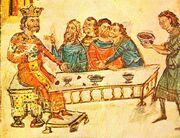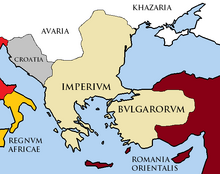| |||||||
| Capital (and largest city) |
Varna (668-670) Constantinople (670-1055) Skopje (1055-1110) | ||||||
| Language official |
Greek | ||||||
| others | Bulgar, Old Bulgarian | ||||||
| Religion | Tengriism Slavic paganism Chalcedonian Christianity Islam (840s onwards) | ||||||
| Ethnic Group | Bulgars South Slavs | ||||||
| Demonym | Bulgarians | ||||||
| Government | Absolute monarchy | ||||||
| Tsar | Asparukh (670-700) Petar III (1072-1110) | ||||||
| Established | 670 | ||||||
| Annexation | to Roman Empire | ||||||
| date | 1110 | ||||||
The First Bulgarian Empire (Greek: Βασιλεια Βουλγαριων, Bulgarian: българско царство) was a historical state that ruled much of the Balkans and Anatolia for several centuries in the early Middle Ages. It was founded in AD 680 when Asparukh Khan of the Bulgars, having united the many Bulgar and Slavic tribes of the area, conquered the Balkans and was proclaimed Emperor in the old Roman capital of Constantinople.

Krum, one of the greatest Bulgarian emperors.
The Bulgars were a Turkic people who had until recently dwelt on the steppes north of the Euxine. After the death of Kubrat Khan they began a migration into the Balkans where, having formed an alliance with the local Slavs, they conquered the region almost without resistance after scoring a decisive victory at Ongal in 678. Over several decades the Bulgars became assimilated into the majority Slavic population, forming the ethnic group known today as the Bulgarians.
Asparukh's son Tervel Caesar completed the conquest of Attica and the Pelloponese and invaded the coastal regions of Anatolia. By adopting many Roman customs and the title of Caesar he reconciled the urban Greek population to his rule, providing internal stability for years to come. His successors would transform Bulgaria into a superpower of the region, even after the end of expansion into Asia.
In 825 Emperor Omurdag tried to make Islam the official religion of Bulgaria, but backed down after the move sparked fierce rebellions among the Greeks of Europe. However, his grandson Presian I and great-grandson Boris I renewed the attempt in the 840s, and by the end of the century Islam had become mainstream in place of the traditional paganism.
By the 11th century the power balance had shifted. Bulgaria had begun to stagnate, rocked by endless civil wars and invasions by Magyars and Khazars, while conversely a newly-resurgent Rome had restored its finances with African assistance and was eager to reclaim its old territories. Slowly the Asian frontier was pushed back and raids on coastal towns became commonplace, until in 1033 a Greek rebellion in Achaea declared for Rome and invited Roman troops in to reconquer Greece.
In June 1055 days of rioting in Constantinople forced Petar II to flee the capital, upon which the Greek population opened the watergate and allowed the Roman fleet in Bithynia to take the city. The rump Bulgarian state managed to hold on to Macedonia and Moesia by paying tribute and swearing allegiance to Rome, but it was finally conquered in 1110 by Alexios I Komnenos in retaliation for Bulgaria's assistance to the Great Crusade.
Nevertheless the Bulgarian people lived on, never forgetting their past glories. The Second Bulgarian Empire began in the 17th century with a rebellion against Roman rule, intending to be the direct successor to the First Empire, and lasted until 1961 when it was replaced by the Republic of Bulgaria.



